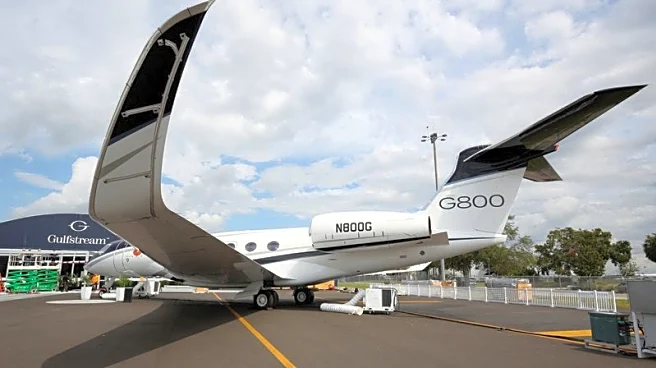What's Happening?
Jeff Bezos, founder of Amazon and Blue Origin, has made bold predictions about the future of human civilization, suggesting that millions of people will be living in space by 2045. Speaking at Italian
Tech Week 2025, Bezos expressed optimism about the technological advancements that will lead to a 'golden age' where humans are happier, richer, and working fewer hours. He envisions robots taking over mundane tasks, including the morning commute, allowing humans to focus on more fulfilling activities. Bezos believes that interplanetary travel and artificial intelligence will drive this transformation, with robots performing tasks on the moon and beyond, making it more cost-effective than sending humans. Despite concerns about AI's potential negative impacts, Bezos remains confident that technological inventions will continue to enhance civilization.
Why It's Important?
Bezos's vision of space colonization and increased reliance on AI has significant implications for various sectors. The prospect of millions living in space could revolutionize industries such as aerospace, technology, and robotics, creating new job opportunities and economic growth. However, this vision also raises questions about the ethical and environmental impacts of space colonization. Critics, including Bill Gates, argue that efforts should focus on solving Earth's problems before venturing into space. The debate highlights the tension between technological optimism and the need for sustainable development. If realized, Bezos's predictions could reshape societal norms, work-life balance, and the global economy.
What's Next?
As Bezos and other tech leaders push forward with their space ambitions, the next steps involve continued collaboration with agencies like NASA and advancements in AI and robotics. SpaceX, led by Elon Musk, is already working towards Mars missions, with unmanned rockets potentially launching as soon as next year. The development of space careers could become a major focus, attracting young professionals to new, exciting roles. Meanwhile, discussions around the ethical implications of AI and space colonization are likely to intensify, prompting policymakers to consider regulations and frameworks to address these challenges.
Beyond the Headlines
The push for space colonization and AI integration could lead to long-term shifts in cultural and ethical perspectives. As humans potentially move beyond Earth, questions about identity, governance, and resource allocation will arise. The reliance on robots for labor may redefine human roles and societal structures, challenging traditional concepts of work and productivity. Additionally, the environmental impact of space activities and AI development will require careful consideration to ensure sustainable practices.










